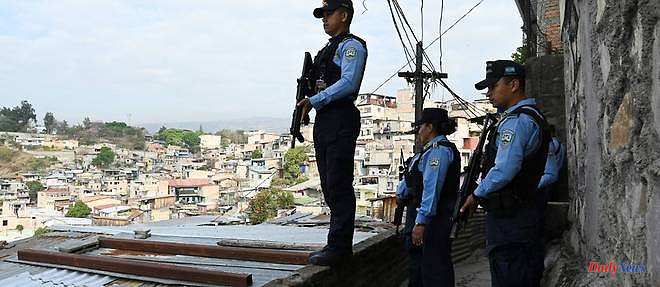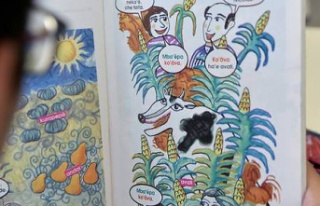Armed with assault rifles, a dozen police storm a neighborhood in the suburbs of the Honduran capital, Tegucigalpa: an operation against criminal gangs inspired by the "war against the maras" waged in neighboring El Salvador under the impulse of President Nayib Bukele, without convincing the Hondurans.
The police must climb the concrete terraces of the Colonia Divanna, whose houses are built on the steep sides of a mountain.
At the head of the small group that roams the alleys lined with brick hovels with tin roofs, non-commissioned officer Maria Dominguez, a woman of the Lenca ethnic group, clings to her automatic rifle Galil Sar, of Israeli manufacture.
The neighborhood is "under the control of the Barrio 18 gang", one of the most fearsome "maras" who sow terror in the north of Central America, she explains to AFP: "It's a place where they can (...) hide".
In Honduras, the "mara" Barrio 18 and that of the Mara Salvatrucha shared the territory. Where they are established, they lay down the law, hold residents to ransom and control the sale of drugs, while contract killers spread terror.
The doors of the houses remain closed to the passage of the police. The silence is broken only by the barking of locked dogs.
At the top of the district, a basketball court where graffiti claims the presence of Barrio 18.
Since December 6, 2022, left-wing President Xiomara Castro's Honduras has been living under a state of exception which allows arrests without a warrant, similar to the one in force for a year in El Salvador.
On March 31, the President met with the heads of the armed forces, the deputies and the Supreme Court, to launch a "second stage" of the war against criminal gangs with the deployment of the military in the streets.
Now, "the army and the air and naval forces will collaborate effectively" to fight organized crime, the government announced.
Putting soldiers on the streets is nothing new in Honduras, which remains one of the most violent countries in the world despite ending 2022 with a 16-year low in homicides.
But even in detention, the bandits continue to direct their criminal activities, and recent simultaneous clashes between rival gangs in four different prisons in early April left one dead and seven injured.
President Xiomara Castro retaliated by ordering "real disarmament" of prisoners and a sweeping sweep against corrupt networks among prison staff that allow guns, phones and drugs to enter prisons.
However, sporadic clashes have continued and result in injuries almost daily.
If the Salvadoran president arrested more than 67,000 suspected criminals during massive raids, despite protests from the Catholic Church, the UN or human rights NGOs, the copy in Honduras pales in comparison.
"More than 530 members of organized criminal structures were captured in the first months of the year," Mario Fu, spokesman for the specialized anti-maras police unit, told AFP.
But it is a derisory figure, according to the Honduran criminologist Gonzalo Sanchez who sees there "a lack of will" of the government in its fight against crime.
In any case, the small squad that AFP followed withdrew from Colonia Divanna without having made the slightest arrest.
However, less than three months ago, the neighborhood police station was attacked by bandits who opened fire on a car, killing a police officer.
The state of exception, initially decreed for a month for neighborhoods held by criminals in the region of Tegucigalpa and the industrial city of San Pedro Sula, has since been extended and expanded to cover 123 of the country's 293 municipalities, officially because of its "good results".
But in another neighborhood of Tegucigalpa, Colonia Aleman, which had been chosen to launch the campaign against criminal gangs, the population mocks government policy.
Here, we no longer speak of a state of exception "but of a state of disappointment because (the authorities) do nothing" while the criminals continue to extort the population, mocks David Velasquez, a resident of the district aged 65. years.
28/04/2023 08:35:33 - Tegucigalpa (AFP) - © 2023 AFP












